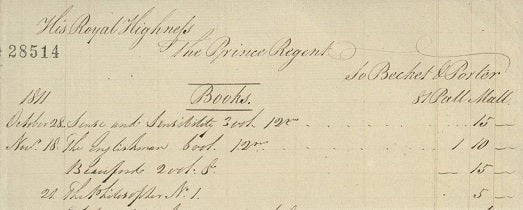
Jane Austen and the Prince Regent: A Royal Connection Revealed
An Archival Discovery That Sheds New Light on Literary History
The British monarchy's archives hold countless curiosities that enrich our understanding of historical figures and their relationships. One such revelation has recently surfaced: a document dated October 28, 1811, confirming that the Prince Regent, the future King George IV, was among the first buyers of Sense and Sensibility, the debut novel of Jane Austen. Remarkably, this purchase occurred just two days before the novel was publicly advertised, with the prince paying 15 shillings—equivalent to about £35 today.
Royal Interest in an Anonymous Debut
When Sense and Sensibility was first published in 1811, it bore no author's name. Instead, the title page read simply, "By a Lady," a common practice among women writers of the era who preferred anonymity. Austen was virtually unknown to the public, but her sharp wit and social insight caught the attention of those who mattered—including, it seems, the heir to the throne.
Though unexpected, the prince's early interest in Austen's novel may be attributed to his wide-ranging tastes and his court's enthusiasm for new literature. The royal purchase added an unexpected layer of prestige to the release of Sense and Sensibility, even if Austen herself remained anonymous to most readers.
Austen’s Reluctant Royal Dedication
Despite the Prince Regent's patronage, Jane Austen did not hold him in high regard. George IV was known for his extravagance, gambling debts, and scandalous personal life—traits that clashed with Austen’s conservative values and moral sensibilities. To her and many in provincial England, he represented the excesses of the elite.
Nevertheless, in 1815, when Austen was preparing the publication of her novel Emma, she received an unusual request. Through his private librarian, James Stanier Clarke, the prince suggested that she dedicate the novel to him. Feeling she had little choice, Austen complied. The resulting dedication, which appears in the first edition of Emma, is famously formal and notably lacking in warmth:
"To His Royal Highness, the Prince Regent, this work is, by His Royal Highness's Permission, most Respectfully Dedicated by His Royal Highness's Dutiful and Obedient Humble Servant."
This dedication is often interpreted as a subtle form of protest, its repetition and exaggerated politeness masking Austen's unease.
Correspondence and Creative Boundaries
The relationship between Jane Austen and the Prince Regent was mediated almost entirely through James Stanier Clarke, who was genuinely enthusiastic about Austen's work. Clarke maintained a respectful correspondence with her and even suggested that she write a novel focused on the royal family.
Austen, with characteristic tact and wit, politely declined. She knew her strengths lay in portraying the social microcosm of rural England, not in flattering royal figures. Her refusal underscores her artistic integrity and resistance to writing under pressure from powerful figures.
A Visit to Carlton House
In November 1815, Austen visited Carlton House, the prince's London residence, likely at Clarke's invitation. During this visit, a watercolor portrait of Austen may have been created, now housed in Clarke's Friendship Book. The visit, though undoubtedly significant, did little to change Austen’s view of the prince or his lifestyle.
The Role of the Monarchy in Austen's Rise
While Austen may not have appreciated the prince personally, his interest in her work contributed to her rising reputation. By 1815, she was no longer an anonymous figure. Word had spread in London literary circles that the Prince Regent admired her novels. This royal endorsement helped bring her work to the attention of a wider audience and lent a veneer of social approval.
It is worth noting, however, that George IV’s admiration was probably more symbolic than intellectual. Known for his flamboyant tastes and shallow engagement with the arts, it is unlikely he was a devoted reader of Austen’s intricate social novels. Yet his involvement, however superficial, helped elevate her profile.
Contrasting Worlds: Austen vs. George IV
The dynamic between Jane Austen and the Prince Regent is a study in contrasts. Austen—a reserved, morally principled writer from rural Hampshire—stood in stark opposition to the future king’s lavish lifestyle and public scandals. He was everything she criticized in her fiction: vain, irresponsible, and lacking self-awareness.
And yet, the machinery of literary fame sometimes turns on such ironies. Austen’s principled distance from power did not prevent that very power from advancing her career. The prince’s endorsement gave her legitimacy in elite circles, even as she privately held him in low esteem.
The Broader Impact of the 1811 Receipt
The rediscovered 1811 purchase record is more than a minor archival curiosity. It confirms that Jane Austen’s debut work caught the eye of Britain’s highest social echelon from the very beginning. It also complicates our understanding of how literary reputations were built in the Regency period. Patronage, even when unwanted, could open doors that would otherwise remain closed.
This small piece of paper from 1811 provides a window into a complex interplay of power, literature, and personal conviction. It shows that even the most private and cautious of writers could not entirely avoid the influence of monarchy and social prestige.
Lasting Legacy
Today, the connection between Jane Austen and the Prince Regent adds a layer of historical intrigue to her biography. It reminds us that even writers of profound integrity sometimes had to navigate the demands of power. Austen did so with grace and subtlety, never compromising her voice, even when pressured by royal interests.
The rediscovery of this document also reaffirms the enduring appeal of Austen’s world. More than two centuries after her first novel appeared, her works continue to inspire readers, scholars, and collectors—including those in the highest circles of society.
